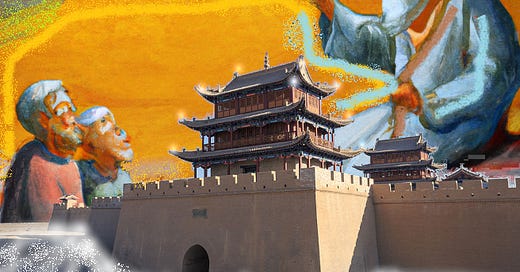NJV. From there he moved on to the mountainous district east of Bethel, were he pitched his tent, with Bethel to the west and Ai to the east. There he built an altar to Yahweh and invoked the name of Yahweh.
Mangghuer. Tiŋsa Gereŋdani mieshi wuladu yaoku gerni sighajiaŋ ma Gereŋda khuonuo a Ayi mieshi. Tidu alani Benirdu zhaŋhaku daodani Benir daodajiaŋ.
from thence he moved on the mountain east of Bethel = tiŋsa Gereŋdani mieshi wuladu yaoku
tiŋsa = from thence
Gereŋdani = of Bethel
mieshi = east
wuladu = to the mountain
yaoku = he went and
Gereŋda is my translation of the Hebrew Bethel, which is built from two components: bayith (בי) (house) and El (אל) (God).
Two components build Gereŋda:
1. ger = house.
2. heŋda = strong.
Thus, Gereŋda means something like House of the Strong One or House of the Mighty One.
mieshi (in front) is a translation of the Hebrew word keh’dem (קדם), which means east or in front. We will return to this later.
he pitched his tent = gerni sighajiaŋ
gerni = tent
sighajiaŋ = spread
At first, I searched Slater’s grammar for a word meaning tent, but could not find one. In search for inspiration, I looked up the Mongolian word for tent.
Based on the first page of Google, the Mongolian word for tent is ger. This makes sense considering the nomadic origins of the various Mongolic peoples.
You’re actually come across ger before. The Turkic-speaking peoples of Central Asia have a different pronunciation of this word: yurt.
there he built an altar to Yahweh and = Tidu alani Benirdu zhaŋhaku
tidu = there
alani = altar
Benirdu = to Yahweh
zhaŋhaku = he built and
Three components build zhaŋhaku:
1. zhan = stand
2. -gha = cause to.
3. -ku = [and he did something else].
I could not find a word meaning build, so I replaced it with make stand or cause to stand.
invoked the name of Yahweh = daodani Benir daodajiaŋ.
daodani = the name
Benir = Yahweh
daodajiaŋ = called.
with Bethel to the west and Ai to the east = Gereŋda khuonuo a Ayi mieshi
Gereŋda = Bethel
khuonuo = to the west
a = [also]
Ayi = Ai
mieshi = to the east
The Hebrew word yawm (ים) means west and sea-ward, which makes perfect sense considering the geography of Israel. My translation of yawm is khuonuo, which means behind or later/after.
The name of Ai, a city in Canaan, is of unknown origin. In Hebrew it is pronounced ah’ee (עי), so I chose to use the Mangghuer word Ayi, which means fear.
The Old Testament details the journey of the Jews as God’s chosen people. This is their story in the House of God, and the coming of Christ was something that many Jews feared. Indeed, they feared it to the extent that they sentenced their own God to the most humiliating death available.
In traditional Christian baptism, and many modern Orthodox ones, you entered a pool from the West, were dunked thrice by the priest, and exited the pool from the East. This mirrors the journey of Christ, who died and rose again – a journey which the Sun mirrors every day.
In this verse, Moses is halfway between the Old and New Testaments. Gereŋda (the house of God) lies in the direction of the setting sun (Death), and Ayi (fear) lies in the direction of the rising sun (Resurrection).
I made the decision to give Ai a new meaning yesterday morning. I wasn’t quite sure how to make it fit. I came back to this piece about 36 hours and one potato harvest later, and this was the justification with which I came up.
KJV. And he removed from thence unto a mountain on the east of Bethel, and pitched his tent, having Bethel on the west, and Hai on the east: and there he builded an altar unto the LORD, and called upon the name of the LORD.
Mangghuer. Tiŋsa Gereŋdani mieshi wuladu yaoku gerni sighajiaŋ ma Gereŋda khuonuo a Ayi mieshi. Tidu alani Benirdu zhaŋhaku daodani Benir daodajiaŋ.



